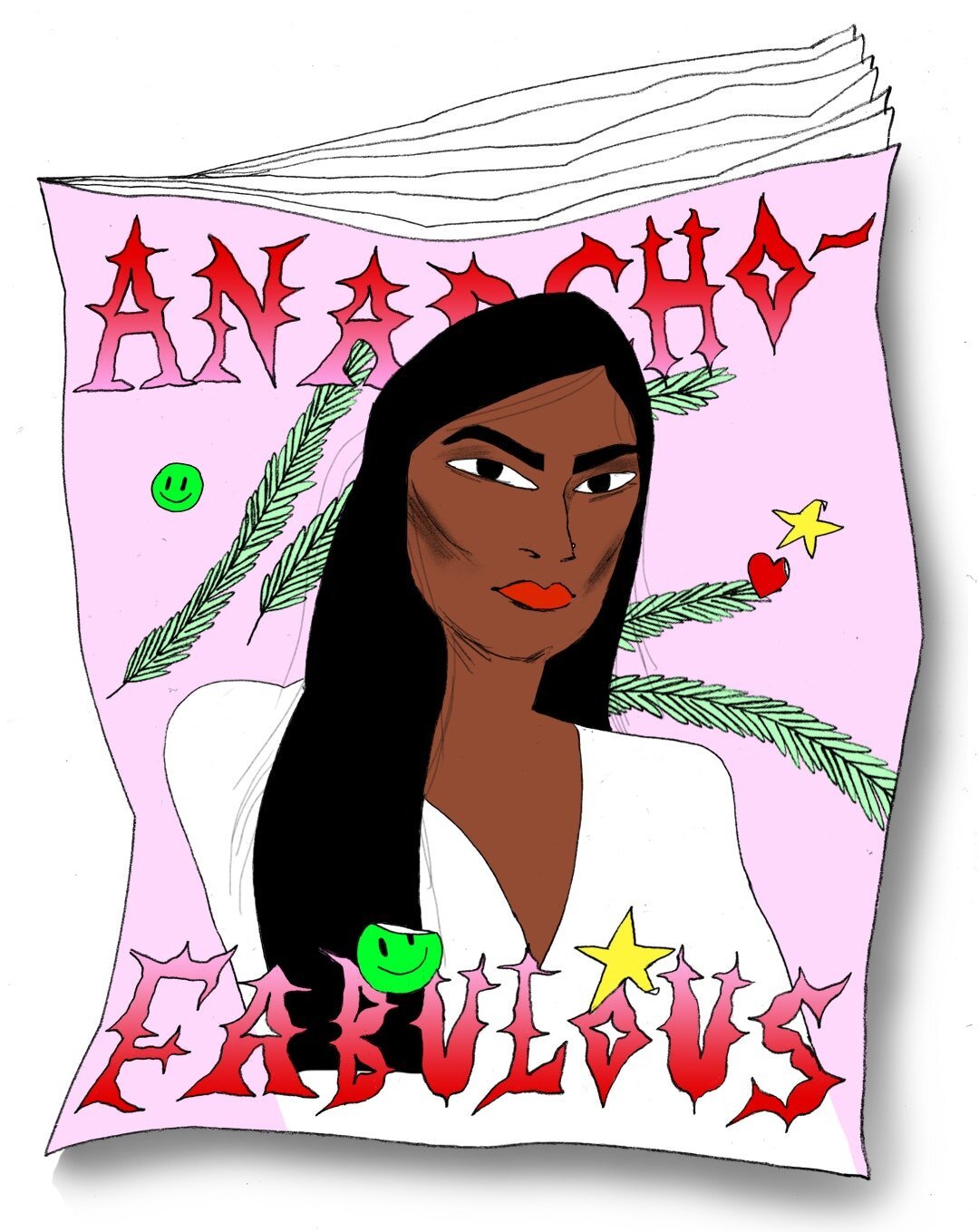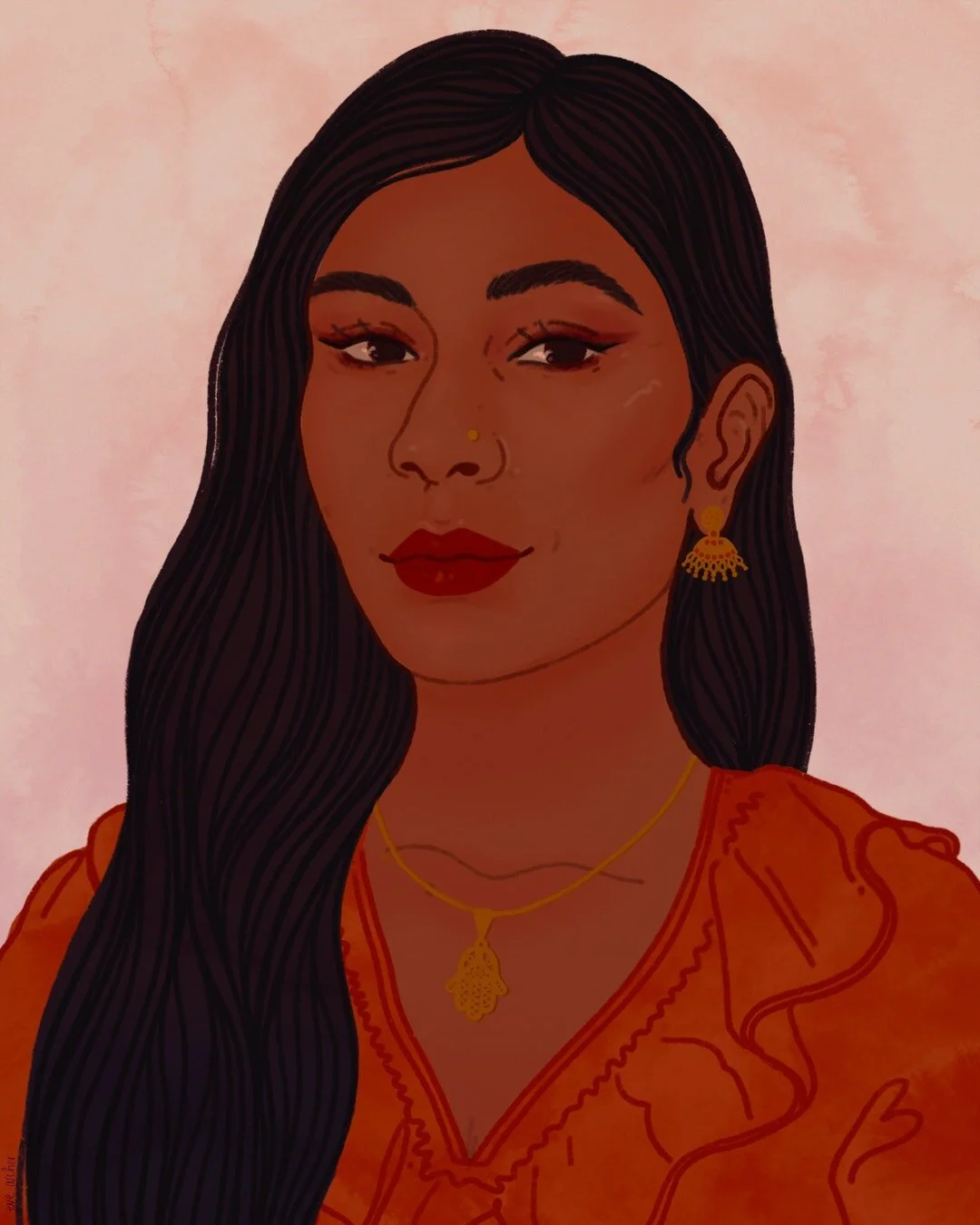The World According to Ash Sarkar
Make it stand out
It’s 10:00 AM sharp, I’m calling Ash Sarkar and she’s elbow deep in flour and butter. “I’m making, as I speak to you, a lemon tart for my boyfriend’s birthday.” I couldn’t be more obsessed. Although she promises she “wouldn’t normally do this Nigella act at ten in the morning,” she offers some invaluable advice: make pastry when the kitchen’s cool “you don’t want the fat to melt, cos otherwise then you’re fucked. Pastry, gone, rubbery mess.”
If you’ve been following the new series of The Thick of It you may be wondering why the mainstream media have stayed suspiciously silent when it comes to challenging those in power. According to the Media Reform Coalition, only three companies own 83% of all national newspapers, whilst just five companies control 80% of online news outlets in the UK. To say there’s a media bias is an understatement.
It’s no wonder then that political commentators like Ash Sarkar, senior editor at Novara Media and lecturer in politics at the Sandberg Institute, have gained such popularity over the past few years. It isn’t solely down to our generation’s insatiable appetite for political memes and Twitter clapbacks either. After a decade of Tory rule, cuts to more services than you can imagine, and a neverending hostile environment, we know we need more than a new government in power.
Working with Novara Media, Ash is part of the movement to redefine alternative, left wing media and bring accessible politics to a younger generation. A born Londoner, she’s witty and assertive with an encyclopaedic political knowledge.
Raised between Enfield and Tottenham by a working single mother, she grew up in communities where people supported each other. “That’s not to say that it was always perfect,” Ash recalls. “Next door, on one of the streets that we lived on, this really racist family moved in and they started putting lit cigarettes through the letterbox, doing all this stuff, yelling horrible abuse at me and my sister and mum. So I’m not romanticising it at all. But there was also a lot of mutual support which also ran across other community divides.” Solidarity was a “necessity thing,” where Jamaican neighbours helped with the childcare and left ginger cake for Ash and her sister through the hole in their garden fence, and the Turkish Cypriot family with seven strapping sons always welcomed them whenever the barbecue was going.
___STEADY_PAYWALL___
Ash’s political education started early. Her mum was part of the Newham Monitoring Project, while also helping to establish domestic violence services specifically for Black and Asian women and campaigning against the so-called virginity testing of South Asian migrants at Heathrow Airport. “She was involved in that whole milieu of what at the time was called Black radicalism, because that was at the time when political Blackness was still a thing.” Reacting to the dearth of children’s books featuring Black and Asian children in the early-mid 90s, Ash’s mum brought home storybooks by the radical publishers Bogle-L'Ouverture, run by Guyanese activists Eric and Jessica Huntley.
“She taught me and my sister to read by making these picture books herself using photos of us, or drawings that she’d done, so that we could see especially dark-skinned Asian children front and centre.” When they outgrew the picture books, she would bring them magazines featuring Black models on the cover. “That meant Naomi Campbell was the icon, just beautiful and powerful. I think I was about 6 or 7 – she posed for Playboy. And I’ll never forget, she was wearing white latex on the cover, so my mum brought home this Playboy and put loads of stickers and smiley faces over the nipples so we couldn’t see anything!”
Getting into politics “was an accidental journey,” although her mum’s radical influence coupled with formative years spent in a strong community undeniably had an impact. “I was one of those really earnest school children who did school walkouts because of the Iraq war. I’ve always been part of that protest left. I was probably a really, really, really annoying school child. I was like, I have these really sincerely held beliefs and I’m going to talk to you about them a lot!”
Studying her English Literature Undergraduate degree at University College London, Ash was in the first term of first year when the 2010 student protests erupted in response to the Tory-Lib Dem coalition raising tuition fees (thanks Nick Clegg.) Between November and December 2010, up to 50,000 students and workers took to the streets in Central London, with many taking action and occupying universities across the country. UCL was the central hub for nationwide occupations, and Ash attended protests at Millbank and Parliament Square where police violence resulted in Alfie Meadows, a friend of Ash’s, needing emergency brain surgery.
“That was really formative, because it shows you that economic policy is imposed with an iron fist. I think there was very much this view of, if the back of the student movement could be broken, then the rest of austerity could be implemented without too much trouble. That is what happened. It wasn’t just in terms of tuition fees got trebled and that’s it – the education maintenance allowance got scrapped; you had huge cuts to local authority budgets for secondary education; you had adult learning initiatives being scrapped as well as those for English as a second language.”
After her Masters, Ash began working with Novara Media. What started as a few media slots “here and there” soon turned into political prime time TV. “If you’d told me that by the age of 26 I’d be on Question Time for the first time,” Ash says, “if you’d told me that at 25, I wouldn’t have believed you.” The world of media appearances and panel shows sound bizarre, and it must be for somebody as seemingly authentic and down to earth as Ash. “People are all still performing when they’re in the green room or they’re talking one on one. I’ll never forget these things which people who have deeply abnormal lives say to appear normal, so they’ll go, ‘oh my goodness, have you watched The Bodyguard? I’m absolutely hooked!’’ Ash recounts in a spot-on, posh Disney villain accent. “And you’re just a bit like, oh wow, ok. There’s a strange hammy-ness to it all.”
Troublingly, the fear of violence is a very real threat when you’re in the public eye, and Ash once found herself being chased by far-right protesters. Last year, Owen Jones, a close friend of Ash’s, was beaten up in a homophobic and politically motivated attack. With over 242,000 Twitter followers and a growing public presence, Ash constantly faces racist, sexist, patronising trolls. “I do the thing which everyone says you’re not supposed to do,” she admits. “People say the best thing to do is ignore but I like a clapback, personally.” Responding is a way of “reclaiming a bit of agency, to be like, you will never be able to par me better than I can par you. I think that’s almost a secondary school thing, where you’re like listen, Keith from Broxbourne, I went to an all-girls school in North London. If you think you’re gonna get the last word, you are having a laugh, mate.”
Halfway through our interview it’s time for a pie-check. “I’m now rolling out the pastry. Oh please don’t crack! Yes, it’s from scratch. The thing is though, there’s an element of competitiveness to it. You want to be that bitch who cooks from scratch, don’t you?” Yes, tbf, I really do.
The past decade has seen more young people engaging with politics than ever before, from movements like the school climate strikers, to the Hong Kong protests, to the March for Our Lives organised by Parkland School survivors. If you’re wanting to get involved there are a myriad of ways and “the best thing that you can do,” Ash advises, “is listen to what your instincts are telling you, and think about why they’re leading you in particular directions. That doesn’t mean being uncritical. That means get really good at thinking about what you feel and why. Stay curious, read as widely as you can, but also don’t think that you’ve got to get a BTEC in hot takes before you’re allowed to have an opinion.”
Book recommendations include Reni Eddo-Lodge’s Why I’m No Longer Talking To White People About Race, Chavs and The Establishment by Owen Jones, Mahasweta Devi’s Imaginary Maps, and, “if you’re after something a big spicier, maybe a bit more complex, Franz Fanon’s Wretched of the Earth – incredible.” Don’t limit yourself to “ dry academic texts,” politics should be fun and engaging, and Ash suggests reading fiction in all forms for inspiration.
Believing that “everything belongs to everyone,” Ash is ‘literally’ a communist. But a Soviet Communist she is not! “We live in a world where people die because they don’t have money! That’s insane to me!” Communal stewardship and ownership is the progressive future the world needs, “I think the idea that there should be private ownership of the resources that we all need to survive is antithetical to the values of humanism, and human flourishing.”
With the farce that is Conservative British politics unfolding before our eyes, Labour’s own internal struggles were laid bare with the recent Labour Leaks and arguably centrist Keir Starmer’s election as leader. “I think that people should put their energies where they feel their energies are most useful,” recommends Ash, “if that means, stay, I think definitely stay. I would caution people against the idea of, well let’s just abandon the Labour party, because actually, if you want to change the face of national politics, you need a national electoral vehicle.” It’s the double standard in how racism is reported and tackled which Ash finds problematic. Whilst she appeared on an hour-and-a-half long Victoria Derbyshire special on anti-Semitisim within the Labour party, other forms of racism have gone unnoticed by the media. “What that risks saying is that we don’t care about anti-Black racism, we don’t care about Islamophobia, and we only care about racism in the Labour party if it’s seen to come from one political faction, and that is corrosive to UK politics.”
One easy way to engage with changing the political landscape is to join a union (Ash is a member of the National Union of Journalists.) “It’s so important” she says, “and is going to get more important, because we’re going to see some hideous treatment of workers; redundancies, reductions of hours, and encouraging people to go back to unsafe working environments, so join a union! I can’t bang that drum hard enough. Unions have got one job and one job only, and that’s to protect their workers. It’s not an ominous thing.”
You’ve got Amy Hart from Love Island being like, I’m part of Unite! I saw a really funny tweet that was like, obviously she’s pro-union, she came to Curtis with a full list of grievances. Like what a legend.”
Saying goodbye to Ash and her lemon pie, I’m left feeling, as cheesy as it sounds, empowered. Too easily, political discourse revolves around “willy waving” as Ash calls it, and less on solidarity and radical change. She’s right, you don’t need to bore yourself with academic texts if that doesn’t work for you; politics needs to be accessible and engaging. The past decade of this heinous Tory government has at times been heartbreaking and overwhelming, but to know Ash Sarker is out there representing, baking cute pies and clapping back at gross Twitter trolls is a true comfort. Thank god for her.
Words: Luisa Le Voguer Couyet | Illustrations: GC Sziklay, Eve Archer, Marlena Synchyshyn and Rania Esstafa



